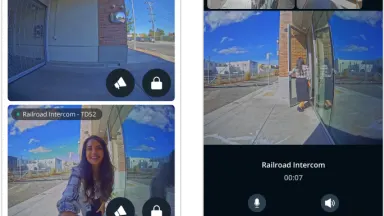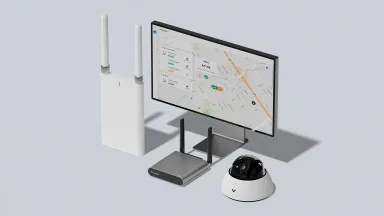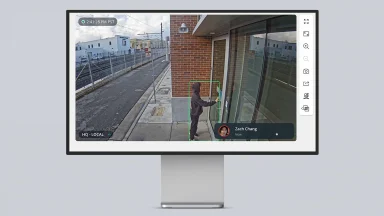Verkada’s APIs & Integrations: Facilitating Interoperability with Third-Party Systems
Physical security operations are a crucial component of an organization’s network of business tools, and it’s essential that these systems integrate seamlessly. Many organizations require exporting system logs and user events to databases to comply with stringent security policies. Other, more data-driven organizations, export their Verkada Occupancy Trends data to third-party platforms to display people and vehicle traffic in custom dashboards.
To this end, Verkada offers an expansive library of API endpoints and out-of-the-box (OOTB) integrations that support interoperability between Command, Verkada’s cloud-based management platform, and other applications. This blog highlights how hundreds of Verkada customers leverage APIs and pre-built OOTB integrations to address a variety of business and operational needs.
An Extensive Library of API Endpoints for Highly-Customizable Integrations
Verkada’s APIs enable organizations to ingest and extract relevant data across a variety of platforms, applications, and databases. Designed for high levels of customization, these endpoints balance simplicity and usability with the flexibility required to design and optimize unique workflows.
Verkada’s library of API endpoints is called an average of 2 million times per day by hundreds of different organizations. Below we illustrate some API applications that have helped enterprises expand the reach of their Command platform and bridge it with other operational systems:
The Streaming API allows organizations to stream both live and historical footage from cameras. This API makes it easy to ingest footage into third-party Global Security Operations Center (GSOC) software for live monitoring or into customized analytics software for operational insights.

Griffin Fast Lube leverages Oculytix Radar, a third-party service analytics platform, to measure the time a vehicle spends in a service bay. The data shown here in overlay boxes on top of each vehicle – the length of time a vehicle has been sitting in a service bay – is then displayed in custom dashboards, which provides valuable operational insights across multiple locations. Live Verkada camera feeds – shown in the top-right – are ingested directly into Oculytix via the Streaming API.
The Get Occupancy Trend Data API endpoint allows organizations to extract foot or vehicle traffic data for further analysis. Among other uses, this API enables retailers to better understand these traffic patterns and adjust product placement or staffing accordingly.
Access Events Webhooks enable organizations to receive real-time events and logs from their Verkada access control system. This helps users analyze activity for potential security threats by integrating Verkada data into third-party applications.
OOTB Integrations with Common Third-Party Security Solutions
While APIs offer developers resources to assemble custom integrations for different business requirements, many organizations require plug-and-play integrations with industry-standard systems like Mass Notification Systems (MNSs), Real Time Crime Centers (RTCCs), and GSOCs. As such, Verkada partners with a variety of third-party technology providers to design, build, and validate integrations with commonly-used applications. These integrations can be deployed in minutes and enable organizations to extract additional value out of their Verkada deployments. Below we present examples of commonly-deployed integrations and highlight their benefits:
Auror: Organizations can export video archives from Command to Auror to consolidate and share footage to a network of retailers and law enforcement in order to better identify repeat offenders.

Archived footage from a Verkada CD42 dome camera pulled into Auror’s evidence locker. Items within Auror’s evidence locker can be shared with other authorized parties, making it easy to search and filter for relevant video footage of repeat offenders across a network of organizations.
Axon Evidence: Organizations can export video archives from Command to an Evidence.com account to simplify management of digital evidence used for criminal investigations.

A 538MB archive captured on a Verkada CD62-E camera and saved within an Axon Evidence account. Axon Evidence stores and organizes digital evidence used for criminal investigations, providing a centralized platform to manage both internal and external access to relevant video and audio files.
FUSUS: Organizations can connect Verkada Cameras to Fusus’ RTCC to help law enforcement access security cameras in emergency situations and improve incident response effectiveness. The integration also enables users to pull Verkada license plate detections into the Fusus platform for even greater situational awareness.

Three Verkada camera feeds visible within FUSUS’ RTCC platform. FUSUS provides law enforcement with live access to security cameras in emergency situations – increasing visibility of unfolding security incidents and providing valuable real-time information.
Singlewire: Organizations can connect Verkada notifications to Singlewire’s mass notification system, InformaCast, which allows schools – like large higher education campuses – to broadcast Verkada’s real-time alerts during emergency situations.
A Continued Investment in Interoperability
As Verkada’s platform and product offerings expand, it remains a top priority to increase the number (and ensure consistent quality) of integrations. Verkada’s API library continues to grow in scope and usability, with additional emphasis on comprehensive and developer-friendly documentation. In addition to a robust public API library, Verkada continues to add new OOTB integrations – designed for quick implementation and material operational improvements.
Are you a technology provider interested in partnering with Verkada to build a native integration? Apply to be a part of the Verkada Integrations Program.






